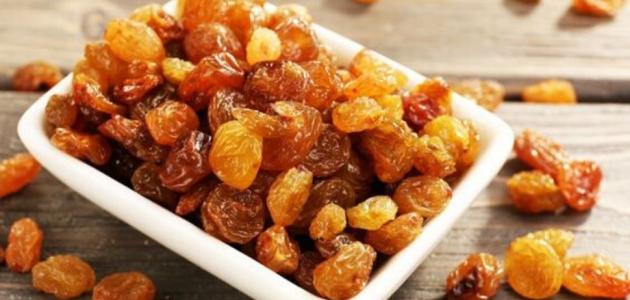Learn about the nutritional value of raisins and its amazing human health benefits

Raisin is a grape that has been dried out either in the sun or by special dryers, and the raisin inside contains a great nutritional value despite its small size.
And when the grapes are dried to produce raisins, its nutritional value becomes more concentrated, which makes a handful of raisins a rich and nutritious snack. They are compatible with fruits in that they are relatively high in energy and sugars. They also contain protein and are almost fat-free and contain many vitamins, minerals and sugars. Such as:
Minerals: calcium, phosphorous, potassium, iron, manganese, sodium, zinc, copper, fluoride, boron and selenium.
Vitamins: Vitamin K, C, E, B2-1-3-5-6-7-9, choline and betan, and also contain 18 amino acids.
And raisins contain other dried fruits with these elements:
Boron
Raisin is a nutrient rich in boron with a concentration of 2.2 mg per 100 g. Boron is one of the essential elements for the growth and maintenance of bones, joints and cartilage, as it positively affects vitamin D and calcium, as it reduces thrombosis.
Clinical studies showed that boron has a preventive and curative effect on osteoporosis and arthritis, by reducing calcium loss in the bones, especially for women after menopause.
Fiber
Clinical studies have proven the importance of fiber to prevent heart disease, diabetes, obesity, constipation and colon cancer. Raisin is a good source of both types of fiber - soluble and insoluble - and its intake helps to meet the daily needs of dietary fiber, which is usually substandard in the fast Western food that has unfortunately become prevalent in Arab society, and the type dried in the sun is distinguished from others in levels The fibers.
Tartaric acid
In addition to its richness in fibers that protect against cancer, it has been found that grapes and raisins are among the few fruits that contain large levels of tartaric acid by 2.0 - 3.5 g per 100 g.
Unlike other fruit acids (such as malic acid and citric acid), tartaric acid extends beyond the small intestine to the colon where it ferments by bacteria, producing short chain fatty acids. These acids play an important role not only in colon health but for human health as a whole, which is thus considered one of The best prebiotic.
Polyphenols
Raisins are an excellent source of polyphenols, which are widely known phytochemicals as antioxidants, protecting cells from aging and death, and ridding the body of harmful minerals.
It can also modify enzymatic activity and prevent abnormal cell division, thereby protecting against cardiovascular diseases, cancer and osteoporosis, some neurological diseases, diabetes and infections.
Phytoestrogens
Raisins contain estrogen-like plant materials such as Daidzein and genistein, in addition to being an antioxidant, which affects the vital cycle within the cell.
Therefore, it plays an effective role in preventing cancer, especially breast and prostate cancer, with a lower risk of cardiovascular disease, and months of this is its ability to relieve menopausal symptoms because of their similarity with estrogen.
In a study comparing the concentrations of diazidine and genistein in 36 types of fruits and nuts, raisins were found to be one of the richest sources, as it contains approximately 1.84 mg per kilogram, while the average content of other foods is between 0.250 and 0.1 mg per kilogram.
From the above, we can expect the benefits of a handful of raisins:
1- Cancer resistance
In addition to fiber, dried fruits, including raisins, contain polyphenols and flavonoids, which are more powerful antioxidants than those found in some fresh fruits, as they prevent free radicals from causing damage to cells in our bodies and limit spontaneous growth of cancer cells as well as its spread, if any, and their effect is more obvious On breast and prostate cancer.
2- Prevention and strength for athletes
Intense physical activity increases oxygen uptake with the possibility of free oxygen formation that causes damage to large biomolecules, such as proteins and DNA, which is called oxidative stress that affects athletic performance in the long run.
Raisins are a preventive agent against DNA damage during intense physical activity by countering oxidative stress, and 170 g of raisins before and during exercise significantly reduces oxidative stress.
Because raisins are one of the foods rich in carbohydrates and have an average glycemic index, it enhances endurance and performance when consumed either before or during exercise as it helps to maintain blood sugar levels, and is ideal as a snack before exercise (snack) to provide sustainable energy and ensure performance The perfect athlete.
3- Cardiovascular diseases
Studies have shown that 2 ounces (56 grams) of raisins daily for 4 weeks reduced ox-LDL levels, which reduces the risk of cardiovascular disease, because it contains fibers and polyphenols.
It is also rich in potassium, which is the main mineral for the functions of cells and tissues and its availability in the diet reduces the risk of stroke. And the addition of raisins to the daily diet led to lower levels of total and low density (bad) cholesterol and reduce inflammation.
4- Oral and dental health
Contrary to popular belief, raisins are an excellent food for dental and gum health, and recent studies indicate that raisins contain five important oral health compounds. They prevent the growth of bacteria, especially streptococcus, which causes cavities and porphyromas that cause gingivitis.
5- Treating thinness
While the process of drying grapes does not add more calories to raisins, losing water increases your calories.









0 Comments